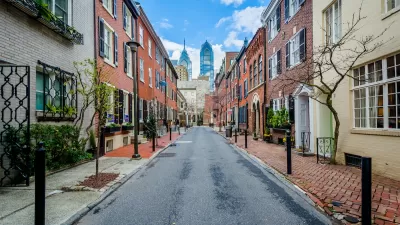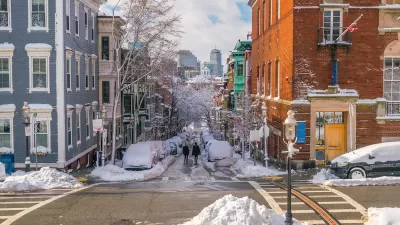The city of Boston is in the midst of a housing boom, and the city is considering asking developers to set aside a larger number of their units for affordable housing.

Boston's hot property market is putting a crunch on affordable housing. The city's Inclusionary Development Policy requires developers to set aside a percentage of their units for lower rents and the city is now considering raising that percentage. "That would make it the second increase in three years," writes Tim Logan.
The Inclusionary Development Policy is one of a few tools the city has for creating affordable housing. "Walsh has tried other ways to boost affordable housing, endorsing a small surcharge on property owners approved by city voters in 2016, and requiring more affordable units in buildings that go up on city-owned land," Logan reports.
Those in favor of raising the requirement point to Boston's housing boom as evidence that more could be asked of developers; those against it caution that adding too many requirements might slow developers too much and stop affordable housing from getting built in the first place.
FULL STORY: Boston might require developers to set aside more low-income units

Americans May Be Stuck — But Why?
Americans are moving a lot less than they once did, and that is a problem. While Yoni Applebaum, in his highly-publicized article Stuck, gets the reasons badly wrong, it's still important to ask: why are we moving so much less than before?

Using Old Oil and Gas Wells for Green Energy Storage
Penn State researchers have found that repurposing abandoned oil and gas wells for geothermal-assisted compressed-air energy storage can boost efficiency, reduce environmental risks, and support clean energy and job transitions.

Placekeeping: Setting a New Precedent for City Planners
How a preservation-based approach to redevelopment and urban design can prevent displacement and honor legacy communities.

Study: Maui’s Plan to Convert Vacation Rentals to Long-Term Housing Could Cause Nearly $1 Billion Economic Loss
The plan would reduce visitor accommodation by 25,% resulting in 1,900 jobs lost.

Idaho Data: Unexpected Vehicle Repairs Exacerbate Housing Instability, Eviction Risk
Over 21 percent of clients struggle with transportation barriers.

A Year-Long Investigation On Permanent Supportive Housing
The New York Times reveals what’s working and what’s not in the cornerstone of Housing First.
Urban Design for Planners 1: Software Tools
This six-course series explores essential urban design concepts using open source software and equips planners with the tools they need to participate fully in the urban design process.
Planning for Universal Design
Learn the tools for implementing Universal Design in planning regulations.
Heyer Gruel & Associates PA
City of Moreno Valley
Institute for Housing and Urban Development Studies (IHS)
City of Grandview
Harvard GSD Executive Education
Salt Lake City
NYU Wagner Graduate School of Public Service
City of Cambridge, Maryland




























